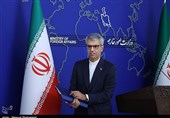Iranian Investors Offered Credit by Brazilian Bank for Farming
TEHRAN (Tasnim) – A Brazilian bank is ready to assist Iranians who wish to invest in foreign farming in the South American nation, according to Fakhruddin Amerian, the chairman of the joint chamber of Iran and Brazil.
Amerian said the bank has declared its readiness to contribute 80% of the funds, with the investor contributing the remaining 20%.
In recent years, overseas farming has received more attention. Iran has fertile soil in some areas, but because of incorrect qualities such a lack of crop rotation and quick soil erosion, researchers are looking into other ways to guarantee food security.
For communities to thrive sustainably and to fight poverty, food security is seen as a major concern of our day.
Utilizing other nations' resources, capabilities, and facilities to produce essential agricultural products in order to maintain and enhance global food security is what is generally meant by overseas cultivation.
One of Iran's long-term goals has been self-sufficiency in strategic agricultural products including wheat, oilseeds, and livestock feed, which requires adequate water resources. However, repeated droughts and a lack of water resources have made this aim unrealistic.
More than 18 million hectares, or 12% of Iran's total land area, of its 162.2 million hectares are used for agriculture. But since 85% of Iran's fresh water is used for agriculture, it makes sense that foreign farming could be a quick way to advance the agricultural sector and restore the nation's water supplies.
Over the past two decades, Brazil has established itself as a head-to-head competitor with the United States in the global crop market. With its extensive land, low farmland prices, and an abundance of sunlight and natural resources, many US farmers and agriculture manufacturers have expanded operations into Brazil to take advantage of the rapidly growing industry.
South Brazil is suitable for growing wheat and rice. Amerian said the Brazilians are ready to provide Iranians with one million hectares of land, which they can even buy if they wish.
Iran is currently importing livestock inputs, soybeans, corn, soybean meal, sugar, meat, and fruit concentrates from Brazil. Amerian said preliminary measures are being taken to import cotton from the country. Meanwhile, preparations have been made for exports of fruits, including dates and raisins, from Iran to Brazil.
Amerian added that the Brazilian agriculture minister had expressed a wish to buy Iranian fruits and saffron during his visit to Iran. According to the agreement made by the two parties, Iran will soon start exporting fruits to Brazil, but no Iranian investor has yet expressed interest in doing the same for saffron, the official said.
Amerian mentioned the effects of the sanctions, stating that there are still banking issues with Brazil for things purchased with cash.
The head of the joint chamber of Iran and Brazil described Brazil as one of the largest food producers in the world, saying Brazilians believe they provide food for one-eighth of the world's population.
“Our imports from Brazil are significant and a significant amount of our needs in terms of corn and soybeans are supplied from Brazil, but it is appropriate that we raise our exports to half of our imports from the country,” he added.
Iran’s private sector, he said, is pushing forward the investment plans in Brazil, but the government must also get involved to develop business.
Brazil needs Iran’s petrochemical products and 3 million tons of its urea. “The export value of 3 million tons of urea is about $2 billion, but we have not managed yet to export this volume of urea to Brazil,” Amerian said.
Before the beginning of urea barter with Brazil, Iran’s exports to the country were less than $100 million, but after the barter, they rose to about $1.5 billion, he added.






